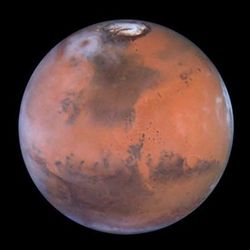Says Discovery Of Potentially Toxic Substance "Is Neither Good
Nor Bad For Life"
 Following days of speculation about the possibility of
conditions on Mars that could support carbon-based life, Phoenix
Mars mission scientists spoke Tuesday on research in progress
concerning an ongoing investigation of perchlorate salts detected
in soil analyzed by the wet chemistry laboratory aboard NASA's
Phoenix Lander.
Following days of speculation about the possibility of
conditions on Mars that could support carbon-based life, Phoenix
Mars mission scientists spoke Tuesday on research in progress
concerning an ongoing investigation of perchlorate salts detected
in soil analyzed by the wet chemistry laboratory aboard NASA's
Phoenix Lander.
Perchlorate is an ion that consists of an atom of chlorine
surrounded by four oxygen atoms. It is an oxidant, meaning it can
release oxygen... but it is not a powerful one. Furthermore,
perchlorates can be toxic under certain conditions.
"Finding perchlorates is neither good nor bad for life, but it
does make us reassess how we think about life on Mars," said
Michael Hecht of NASA's Jet Propulsion Laboratory, Pasadena, CA,
lead scientist for the Microscopy, Electrochemistry and
Conductivity Analyzer (MECA), the instrument that includes the wet
chemistry laboratory.
If confirmed, the result is exciting, Hecht said, "because
different types of perchlorate salts have interesting properties
that may bear on the way things work on Mars if -- and that's a big
'if ' -- the results from our two teaspoons of soil are
representative of all of Mars, or at least a significant portion of
the planet."
The Phoenix team had wanted to check the finding with another
lander instrument, the Thermal and Evolved-Gas Analyzer (TEGA),
which heats soil and analyzes gases driven off. But as that TEGA
experiment was underway last week, speculative news reports
surfaced claiming the team was holding back a major finding
regarding habitability on Mars.
"The Phoenix project has decided to take an unusual step" in
talking about the research when its scientists are only about
half-way through the data collection phase and have not yet had
time to complete data analysis or perform needed laboratory work,
said Phoenix principal investigator Peter Smith of the University
of Arizona, Tucson. Scientists are still at the stage where they
are examining multiple hypotheses, given evidence that the soil
contains perchlorate.
"We decided to show the public science in action because of the
extreme interest in the Phoenix mission, which is searching for a
habitable environment on the northern plains of Mars," Smith added.
"Right now, we don't know whether finding perchlorate is good news
or bad news for possible life on Mars."
The substances are found naturally on Earth at such places as
Chile's hyper-arid Atacama Desert. The compounds are quite stable
and do not destroy organic material under normal circumstances.
Some microorganisms on Earth are fueled by processes that involve
perchlorates, and some plants concentrate the substance.
Perchlorates are also used in rocket fuel and fireworks.
Perchlorate was discovered with a multi-use sensor that detects
perchlorate, nitrate and other ions. The MECA team saw the
perchlorate signal in a sample taken from the Dodo-Goldilocks
trench on June 25, or Sol 30, or the 30th Martian day of the
mission after landing, and again in another sample taken from the
Snow White trench on July 6, or Sol 41.
When TEGA heated a sample of soil dug from the Dodo-Goldilocks
trench on Sol 25 to high temperature, it detected an oxygen
release, said TEGA lead scientist William Boynton of the University
of Arizona. Perchlorate could be one of several possible sources of
this oxygen, he said.
Late last week, when TEGA analyzed another sample, this one from
the Snow White trench, the TEGA team looked for chlorine gas. The
instrument detected none.
"Had we seen it, the identification of perchlorate would be
absolutely clear, but in this run we did not see any chlorine gas.
We may have been analyzing a perchlorate salt that doesn't release
chlorine gas upon heating," Boynton said. "There's nothing in the
TEGA data that contradicts MECA's finding of perchlorates."
As the Phoenix team continues its investigation of the artic
soil, the TEGA instrument will attempt to validate the perchlorate
discovery and determine its concentration and properties.
 ANN's Daily Aero-Linx (04.15.24)
ANN's Daily Aero-Linx (04.15.24) Classic Aero-TV: 'No Other Options' -- The Israeli Air Force's Danny Shapira
Classic Aero-TV: 'No Other Options' -- The Israeli Air Force's Danny Shapira Aero-News: Quote of the Day (04.15.24)
Aero-News: Quote of the Day (04.15.24) Airborne 04.16.24: RV Update, Affordable Flying Expo, Diamond Lil
Airborne 04.16.24: RV Update, Affordable Flying Expo, Diamond Lil ANN's Daily Aero-Term (04.16.24): Chart Supplement US
ANN's Daily Aero-Term (04.16.24): Chart Supplement US



